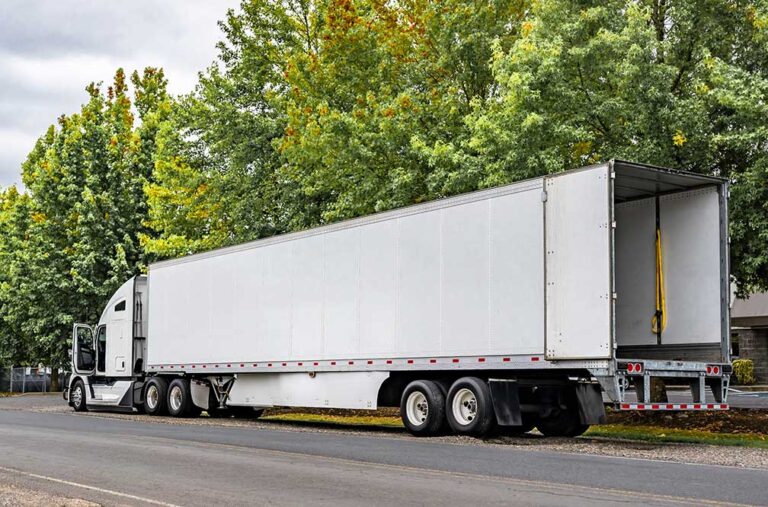It’s an everyday occurrence: A driver pulls into a truck stop, intent on freshening up with a shower, a meal and a little shuteye before heading back out onto the road. The driver exits the truck, gives it a quick once-over to make sure it’s secure and then heads inside.
When the driver returns to the truck, nothing looks amiss, so they hop into the cab and continue on to their destination. But what happens when the doors to the trailer are opened … and those ready to unload the cargo find the trailer empty?
This scenario has played itself out in many different locations, as pointed out during a luncheon hosted by the Georgia Motor Trucking Association in Atlanta in late March.
Cargo theft is a hot-button issue — and it’s getting hotter as these thieves become increasingly sophisticated in their methods.
It’s no longer simply a matter of training drivers to secure their loads and to be alert during stops. Brokering scams, fake trucking companies and highly organized theft rings are becoming increasingly common.
Congressional Testimony
What will it take to stop these freight bandits? If you jokingly said, “An act of Congress,” you’re not far off the mark. There looks to be congressional movement on the issue of cargo theft.
In February, the Senate Commerce Committee’s Subcommittee on Surface Transportation, Freight, Pipelines and Safety held a hearing to address the rise of cargo theft and other crimes in the trucking industry. The goal was to evaluate potential solutions, such as increased coordination and enforcement by federal agencies like the Federal Motor Carrier Safety Administration (FMSCA) and the Department of Homeland Security to stop theft and fraud.
During the hearing, convened by committee chair Sen. Todd Young (R-Ind.), the committee heard testimonies from trucking industry stakeholders.
Adam Blanchard, principal and CEO of Texas-based Tanager Logistics and Double Diamond Transport, shared that his own company has been targeted by fraudsters. As he described it, a “bad actor” posed as Tanager Logistics to steal shipments.
Young asked how these thieves were able to successfully “impersonate” a legitimate motor carrier.
“They are able to do this now through a whole multitude of ways,” Blanchard said. “We have experienced everything … from spoofing our emails and otherwise representing themselves on behalf of our company.
“There are instances out there now where individuals are out there purchasing MC and DOT numbers on the black market,” he continued. “That is a major issue that we have to address, and the FMCSA must do a more efficient job, in our opinion, of ensuring that they go through those companies that are authorized to transport freight in the United States and remove those that are illegitimate.”
Lewie Pugh, executive vice president of the Owner-Operator Independent Drivers Association (OOIDA) also testified during the hearing.
“Cargo theft and freight fraud are so incredibly easy to commit it doesn’t even take a savvy or experienced criminal to pull it off,” Pugh said. “Everyone — from shippers, receivers, motor carriers and brokers — are vulnerable targets.
“Often, the perpetrators of these crimes are based internationally, far beyond the reach of American enforcement agencies,” he continued. “While there are certainly cases of physical theft occurring within our industry, most of the problems small business truckers face involves being scammed by fraudsters or swindled by unscrupulous brokers.”
According to Pugh, these illegal activities “exploded” in recent years, increasing by 600% over the course of just five months between 2022 and 2023. Estimates indicate these crimes cost the industry roughly $1 billion each year. In 2019, loss values averaged $77,000. By 2024, that figure had more than doubled, reaching $161,000.
While cargo theft takes place across the nation, there are five “hotbed” states, where cargo theft is most prevalent. California, Texas, Florida, Illinois and Georgia have all been in the unenviable position of “Top 5” locations prone to cargo theft. Though the bottom three of those states have varied over the past six years, California and Texas have constantly appeared in the top two slots.
Change at State Level
Action to stop cargo theft is also being taken by some state legislatures.
Earlier this year, the Arkansas Trucking Association applauded the Arkansas Legislature for passing a comprehensive package of bills targeting organized retail crime, including Act 322, which significantly strengthens penalties for cargo theft across the state.
“The industry saw unprecedented levels of cargo theft last year, up 27% from the previous year and a 1,500% increase since 2001,” said Shannon Newton, president of the Arkansas Trucking Association.
“These laws demonstrate that Arkansas lawmakers understand the economic threat organized retail crime and cargo theft pose to our industry and all consumers,” she continued. “The success of this organized retail crime package demonstrates what can be achieved when policymakers, industry stakeholders and officials … work together.”
Types of Cargo Theft
According to the FBI there are four different types of cargo theft:
- Straight cargo theft: Cargo is physically stolen from its current location. Cargo thieves often look for items they can steal and sell quickly. This often occurs at truck stops, parking lots, roadside parking, drop lots, rail yards and other situations where cargo is left unattended.
- Strategic cargo theft: Thieves incorporate deceptive tactics to commit theft. This type of cargo theft involves the use of fraud to trick shippers, brokers and carriers into handing loads over to thieves instead of the legitimate carrier. Other current strategic cargo theft trends include identity theft, fictitious pick-ups, account takeovers, double brokering scams and fraudulent carriers as well as the implementation of a combination of these methods.
- Cyber cargo theft: Basic types of cyberattacks are used to aid in committing cargo theft. The attacks include phishing emails that install Trojan horse malware granting access to a company’s systems for thieves to retrieve sensitive data. Thieves then use this information to print out copies of legitimate shipping paperwork they can use to commit fictitious pick-ups.
- Pilferage cargo theft: Criminals alter the bill of lading and pilfer small amounts off the truck.
Resources for TCA Members
“One benefit of membership in the Truckload Carriers Association (TCA) is access to the online learning center, which offers education and training to help motor carriers arm themselves against cargo thieves and other predators,” said Elizabeth Nicholson, TCA’s director of education and training.
She recommends “Tactics for Preventing Cargo Theft,” led by Keith Lewis, vice president of operations for CargoNet. The course is free for TCA members and will help participants understand the current landscape of cargo theft, including emerging trends, targeted hotspots and evolving tactics of thieves. The course also presents real-world cases and examples of cargo theft and the strategies that have been successful in preventing losses.
TCA also has a downloadable resource to help companies identify and report cargo theft. Click here to download.
This story originally appeared in the May/June 2025 print edition of Truckload Authority, the official publication of the Truckload Carriers Association.
Bruce Guthrie is an award-winning journalist who has lived in three states including Arkansas, Missouri and Georgia. During his nearly 20-year career, Bruce has served as managing editor and sports editor for numerous publications. He and his wife, Dana, who is also a journalist, are based in Carrollton, Georgia.











